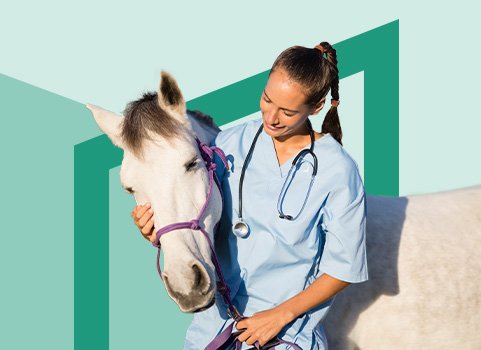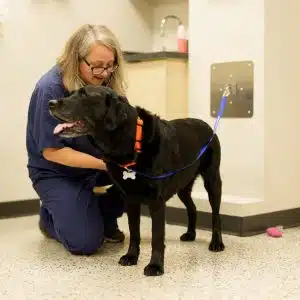Veterinary Oncology Services compared to general veterinary care for tumor patients
The Value of Early Detection: Insights From a Veterinary Oncologist
Early discovery of cancer in pets is an important topic for pet dog proprietors and veterinary professionals alike. Vet oncologists highlight the value of acknowledging refined indications that might suggest major health and wellness problems. Typical symptoms often go unnoticed up until they intensify. Understanding these very early warning indicators and advancements in diagnostic methods can make a significant distinction. What steps can pet dog owners take to boost their animals' possibilities of very early medical diagnosis and much better therapy end results?
Comprehending Cancer in Pet Dogs: Typical Kinds and Signs
While many family pet owners might not realize it, cancer cells is a significant wellness problem affecting animals, just like it does in people. Usual types of cancer cells in pets consist of lymphoma, mast cell growths, osteosarcoma, and mammary tumors. These malignancies can show up in various methods, relying on their location and type. Signs and symptoms typically consist of unexplained weight reduction, consistent throwing up, changes in cravings, or uncommon lumps and bumps. Family pets might additionally display lethargy, difficulty breathing, or reluctance to workout, which can indicate underlying health problems. Early indications can be subtle, making it necessary for pet dog owners to be observant of their pet dogs' habits and physical problem. Comprehending these usual kinds and connected signs can equip proprietors to look for veterinary care quickly, potentially causing earlier medical diagnosis and treatment alternatives. Recognizing the indicators of cancer cells in animals is an essential action in the direction of boosting their health and wellness and lifestyle.
The Role of Veterinary Oncologists in Very Early Detection
Vet oncologists play an important role in the early discovery of cancer cells in family pets, as their specialized training furnishes them with the abilities needed to identify refined signs that might be ignored by general experts. They utilize a combination of medical knowledge and advanced diagnostic devices to examine individuals thoroughly - Veterinary Cancer Specialist. By recognizing very early symptoms and danger aspects, oncologists can guide family pet proprietors toward timely interventions, increasing the opportunities of successful therapy
In addition, vet oncologists typically collaborate with basic professionals to create screening methods tailored to particular types or age teams, improving the performance of very early detection efforts. They educate animal owners on the relevance of normal exams and understanding of changes in behavior or physical problem. Via these positive measures, vet oncologists significantly add to boosting end results for animals detected with cancer, highlighting the vital nature of their duty in veterinary health care.
Advances in Diagnostic Techniques for Animal Cancer
Improvements in analysis strategies have noticeably boosted the ability to spot cancer in family pets at earlier phases. Methods such as innovative imaging, consisting of MRI and CT scans, give in-depth internal sights, permitting vets to determine lumps that might not be apparent. In addition, the development of minimally intrusive procedures, such as great needle aspirates and biopsies, enables accurate tasting of cells for histopathological analysis with lowered stress and anxiety for the pet.
Arising molecular diagnostics, consisting of genetic testing and biomarker identification, are transforming the landscape of vet oncology. These approaches can determine certain cancer types and predict feedbacks to therapy, assisting in customized care plans. Moreover, advancements in research laboratory strategies, such as liquid biopsies, are starting to supply non-invasive choices for keeping an eye on growth progression and therapy effectiveness. Collectively, these innovations represent a considerable leap onward in veterinary medicine, emphasizing the essential role of early detection in improving results for pet dogs diagnosed with cancer.
Exactly How Animal Owners Can Recognize Caution Signs
Exactly how can pet owners end moved here up being attentive in identifying potential indication of cancer cells? Understanding of behavior and physical changes in family pets is important. Common signs consist Click Here of uncommon sleepiness, loss of hunger, or sudden weight changes. Pet dog owners should additionally take notice of consistent throwing up or looseness of the bowels, which may indicate underlying issues.
Changes in the skin, such as swellings, bumps, or sores that do not recover, require immediate vet attention. Additionally, proprietors must note modifications in alcohol consumption habits, enhanced urination, or trouble in breathing. Unexplained limping or discomfort may additionally be indications of even more serious problems.
Routine veterinary examinations can help identify these indication early. By maintaining a close monitoring of their family pets' wellness and behavior, owners can play an essential role in very early discovery, possibly bring about better end results should cancer be diagnosed. Recognizing these signs may considerably influence a pet dog's top quality of life.
The Influence of Very Early Discovery on Treatment Results
Early detection of cancer in pets plays a vital function in identifying treatment end results, as it often enables a bigger variety of healing choices. When cancer is diagnosed in its very early phases, vets can execute less intrusive therapies, enhancing the possibility of effective treatment. Early-stage cancers may additionally respond better to radiation treatment or radiation, causing improved survival prices and general quality of life for the pet.
Furthermore, prompt medical diagnosis facilitates a much more customized treatment strategy, straightening with the specific demands of the animal. This can include customized drug programs or surgical treatments that are less hostile. On the other hand, late-stage detection usually leads to limited choices, more hostile therapies, and poorer prognoses. Subsequently, the importance of very early detection can not be overemphasized; it fundamentally modifies the Resources trajectory of treatment, making it essential for animal proprietors to remain cautious for any type of indicators of disease in their precious companions.
Regularly Asked Questions

Exactly How Can Diet Impact Cancer Threat in Animals?
Diet substantially influences cancer cells risk in pet dogs, as specific nutrients and food kinds can either promote or hinder tumor development. A well balanced, nutrient-rich diet might help lower the possibility of establishing cancer in pets.
Are Specific Breeds A Lot More Prone to Cancer cells?
Particular pet dog breeds, such as Golden Retrievers and Fighters, display greater cancer vulnerability due to genetic proneness. Some feline breeds likewise reveal raised cancer dangers, highlighting the value of breed-specific health awareness among family pet proprietors.

What Are the Costs Connected With Early Cancer Cells Detection?
The expenses associated with very early cancer cells detection can differ considerably, encompassing diagnostic examinations, consultations, and prospective treatments - Veterinary Cancer Specialist. Buying these solutions often causes far better health results, ultimately reducing extra extensive future medical expenditures
Can Vaccines Avoid Cancer Cells in Pets?


Vaccinations might reduce the danger of certain cancers in pet dogs, especially those connected to viral infections. However, their efficiency varies, and family pet proprietors ought to get in touch with vets for tailored guidance regarding inoculation and cancer avoidance strategies.
Exactly How Commonly Should Pet Dogs Be Evaluated for Cancer cells?
Pets should typically be evaluated for cancer cells every year, specifically as they mature or if they exhibit risk factors. Routine veterinary examinations can assist determine prospective problems early, boosting therapy end results and total wellness monitoring.
Early discovery of cancer cells in family pets is an essential subject for pet proprietors and veterinary professionals alike. Early indicators can be refined, making it crucial for pet proprietors to be watchful of their pet dogs' actions and physical problem. Veterinary oncologists play a vital function in the early detection of cancer in pet dogs, as their specialized training outfits them with the abilities needed to determine subtle signs that may be forgotten by basic professionals. By preserving a close observation of their animals' health and actions, proprietors can play a crucial role in very early discovery, potentially leading to better outcomes need to cancer cells be identified. Early detection of cancer in pet dogs plays a crucial function in determining treatment outcomes, as it usually enables for a larger array of therapeutic options.